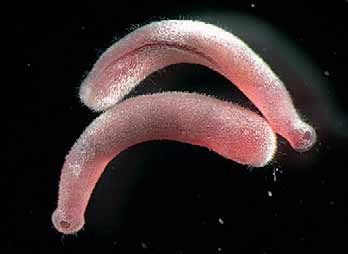
| Palaeos |  |
Aculifera |
| Mollusca | Aculifera |
| Page Back | Unit Up | Clade Up: Mollusca | Page Next |
| Unit Back: Mollusca | Clade Down: Caudofoveata, Solenogastres, Polyplacophora and perhaps Conchifera |
References | Unit Next |
|
Abbreviated Dendrogram
MOLLUSCA |--ACULIFERA | |==Mattheviidae | |--Phthipodochiton | `--+==Heloplacidae (Aplacophora) | | |--Solenogastres | | `--Caudofoveata | `--Polyplacophora `--CONCHIFERA |
Contents
Overview |
 Two specimens of Simrothiellidae sp. ( Aplacophora: Solenogastres: Cavibelonia) in vivo from North Fiji Back-Arc Basin, site White Lady; cruise TUIM06MV (June 2005, MBARI). Strange as it seems, these shell-less worm-like creatures are actually molluscs. Photo by Denisia 18 and ChEss - Biogeography of Deep-Water Chemosynthetic Ecosystems. Publisher: © Chris Allen, Photographer © G. Rouse., Creative Commons Non-Commercial Attribution via Encylopedia of Life. |
This section introduces the Aculifera, which may or may not be a monophyletic clade, and covers the really primitive Mollusca, either worm-like or with shells and plates, or Paleozoic forms resembling modern chitons. Not included are all those creatures we think of as molluscs, most of which belong to the Conchifera or shell-bearers, a huge group that includes all the advanced mollusks: Bivalvia, Cephalopoda, and Gastropoda along with their less known relatives and Paleozoic ancestors. Also the chitons are aculiferan, but deserve their own unit.
The molluscan way of life is ancient. Some elements of the molluscan body plan go as far back as the beginnings of the Bilateria. So, for example, Kimberella, an Ediacaran animal, was quite mollusc-like. In fact, it may even have had a scraping organ analogous to a radula. Whether it actually was related to molluscs is more difficult to determine. Xenoturbella, an extremely primitive living animal, is also mollusc-like, although it is probably a deuterostome. As with most invertebrate groups, Mollusca lacks a reasonable phylogenetic definition, so it is somewhat hard to say where the actual "Phylum Mollusca" begins. As applied in the literature, Mollusca probably corresponds quite closely to the crown group of all living "mollusks," i.e. Solenogastres + garden snails.
Our coverage of the vast diversity of basal molluscs in this and other units is fairly limited. As the cladogram above indicates, the phylogeny is still somewhat controversial (and hence mostly low resolution here). There are also a great many holes. We do have pages on the Solenogastres and the worm-like Caudofoveata, as well as, in following pages, the chitons and some early shelled mollusks, along with the Rostroconchia. Unfortunately, since most early mollusks lacked shells, the fossil record is also quite sparse. ATW, MAK120607
| Page Back | Unit Home | Page Top | Page Next |
ATW050731 New page MAK120607 Creative Commons Attribution